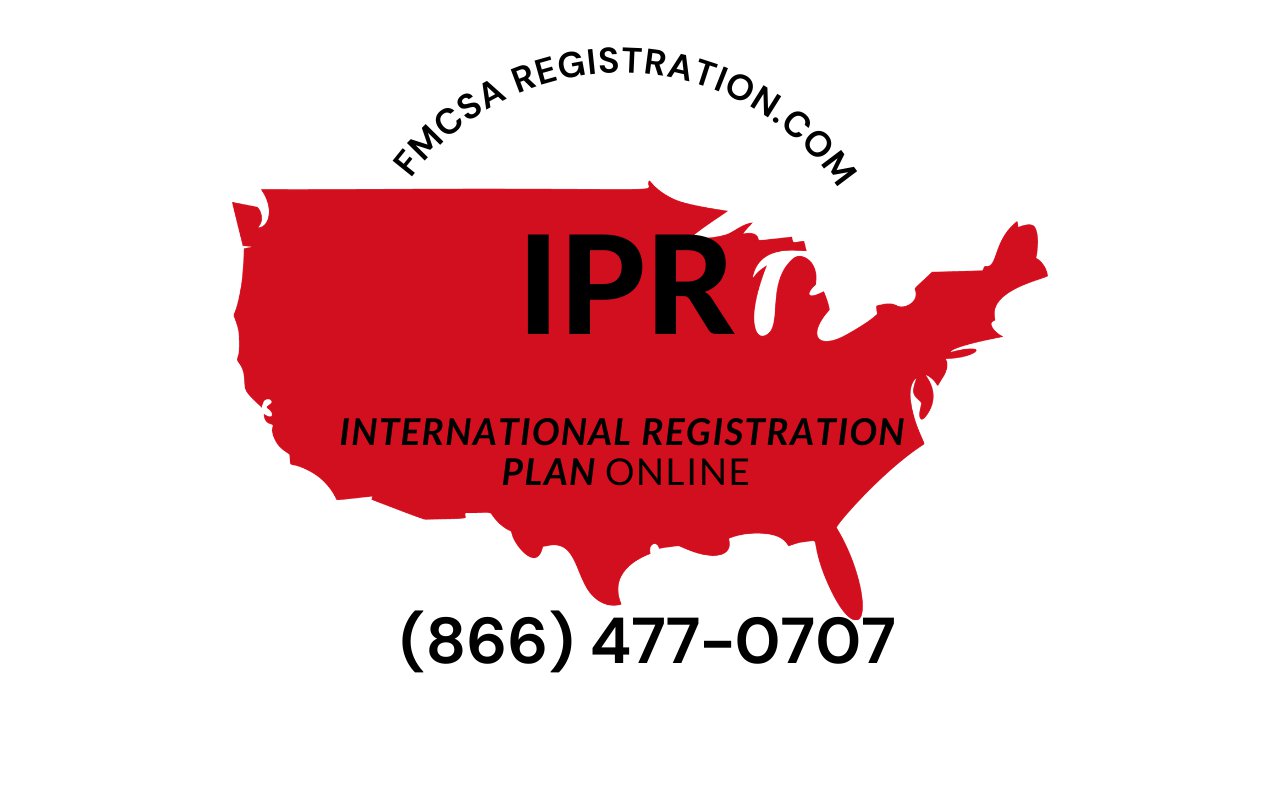
What Are IRP and Apportioned Plates? IRP Registration Overview
Securing the right license plates on each trailer or truck is crucial. All trucking businesses must use the correct plates. It’s always simple to register personal vehicles. But that’s not always the case with commercial trucking vehicles. The trucking industry can make simple processes complicated.
The IRP and apportioned registration process are no exceptions.
But do not despair. Registration LLC is here to help. This page answers many questions about the International Registration Plan (IRP). It also covers the apportioned registration process and cab cards. If you don't see your question listed below, please get in touch with our trucking experts. Check the BOC-3 process. Check out The Basics of Farm Exemptions .
Who Has To Take Care of IRP and Apportioned Registration?
Two main license plate types exist for commercial trucks with a GVWR of 10,000 pounds 26,000 pounds. There are base plates and apportioned plates. Say that your car will never cross state lines away from your state. In this case, all you need is a base plate.
This process would not differ that much from registering a personal vehicle.
But say you're planning on traveling through more than one single state. That’s when matters get complicated. Why? Because you must adhere to the rules of IRP: the International Registration Plan. “Apportioned registration” is a term that refers to IRP.
What Is IRP and What Do I Need To Do?
IRP serves as an official US government agreement. The agreement applies to all states within the US. It also applies to all provinces within Canada. What does irp mean in trucking? Say that you register a commercial truck. You must pay fees within every state that the car will drive through. The fee amount is based on the percentage of miles (per state) where the truck operates. Please get in touch with our organization if you need a visual example of this process. Visit DOT Authority Package.
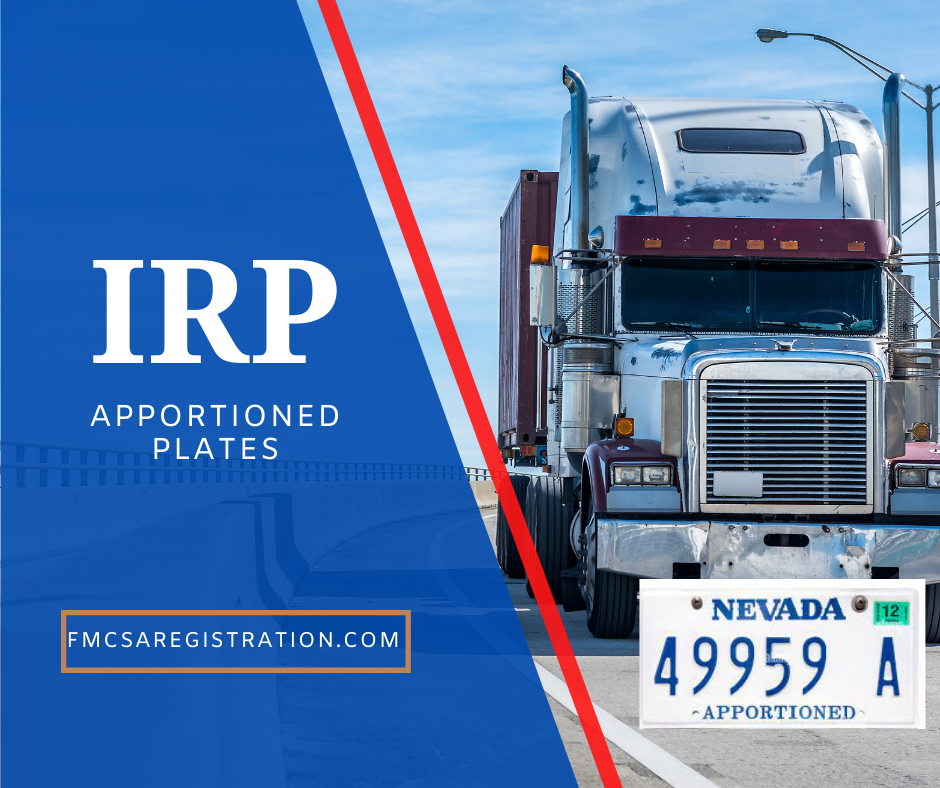
What is the International Registration Plan and Apportioned Registration?
What is the IRP?
The IRP or better known as the International Registration Plan is an agreement that allows free passage over state and international borders for
commercial motor vehicles transporting goods. This plan covers the United States, the District of Columbia, and the provinces of Canada. Truckers can travel freely across state lines without needing separate permits for each jurisdiction. The IRP offers 3 main benefits:
Travel: Drivers can cross state and international borders without the hassle of obtaining multiple permits.
Mileage: The fees vary on the total distance traveled which is both fair and practical for truckers.
Registration: Instead of registering in multiple states, truckers have to sign up in their base state and this one-time registration covers all IRP jurisdictions.
What do we mean by apportioned registration?
Often linked with the IRP, apportioned registration is the equitable distribution of registration fees based on the miles traveled within each state or province. The goal is to ensure that each area receives its fair share of the revenue and it is crucial because the income goes to supporting infrastructure by paying for maintenance of roads and bridges. Also, having one registration plan reduces the administrative burden, so truckers manage one set of plates and one registration card, simplifying paperwork and compliance.
What Are Apportioned License Plates?
Apportioned license plates refer to IRP and apportioned registration. You can interchange these three terms because they adhere to the same process. Know about irp permit service. Apportioned license plates enable commercial vehicles to operate in more than one jurisdiction. Every state in the US gets part of a vehicle’s total registration fees. The amount a state receives is based on the miles traveled in each specific state.
An apportioned plate is a license plate.
Once you receive IRP plates, you must affix them to your commercial vehicles. Apportioned registration refers to GOV registration in a state where a fleet is based. What is an irp number in an IFTA application? Remember that each state has its own code for apportioned vehicle registration. Let our team know if you need help finding the IRP code for your state. Visit Driver Qualification Files.
What Are Apportioned License Plates?
Apportioned license plates refer to IRP and apportioned registration. You can interchange these three terms because they adhere to the same process. Know about irp permit service. Apportioned license plates enable commercial vehicles to operate in more than one jurisdiction. Every state in the US gets part of a vehicle’s total registration fees. The amount a state receives is based on the miles traveled in each specific state.
Why Do Apportioned Plates, Matter?
Using apportioned plates will enable your commercial fleet to travel interstate. You won’t have to worry about registering for every new state. Plus, using apportioned plates will help ensure that you avoid significant fines. Operating interstate without the proper vehicle registration can lead to severe fines and penalties and impact your operating records. All about the NY HUT; New York Highway Use Tax Registration .
What Might Happen if I Don’t Use Apportioned Plates?
Say that your fleet doesn’t have any apportioned plates. Plus, your fleet isn’t registered within the state where it conducts business. This could result in $1,000 fines for every vehicle. Sometimes, the penalties cost even more- mainly when operating a large fleet. Check MCS-150 .
Here is an easy way that a trucking company can track its IRP fees.
You can create a chart. Column one shows the number of miles that a truck runs in every state. The second column will display the percentage of total miles that the truck drives per state. Then, the third column will show the estimated figure for every state’s registration fee. What is irp in trucking?(This number doesn’t need to be exact.) The last column shows the amount due for every state.
So, how do you calculate that amount?
You multiply the percentage of miles run in a state by the state fee. Then, you can add up the truck’s total apportioned registration fee. This will position you to pay the correct amounts to each state, including the home state. If you need to learn more about IRP registration, please call us today. Visit USDOT Number .

How The IRP and Apportioned Registration Fee Process Works
Do you operate commercial motor vehicles in at least two states? If so, you can cut some costs on your IRP registration fees. Say that you plan to register your commercial vehicle through IRP. You can pay apportioned (prorated) fees. Apportioned fees get based on state highway mileage percentage. They apply to each jurisdiction that a truck operates in. Check UCR registration .
Here is an example of paying IRP fees.
Say your interstate vehicle operates 50% of total mileage in Texas. The other 50% of total mileage takes place in Oklahoma. This means that you must pay 50% of your registration fees in each state. (Instead of having to pay the full amount per state.) The IRP Clearinghouse processes fees for each jurisdiction where a vehicle operates. The key is to first inform the IRP Clearinghouse of your base jurisdiction. Have a look at Motor Carrier Authority .
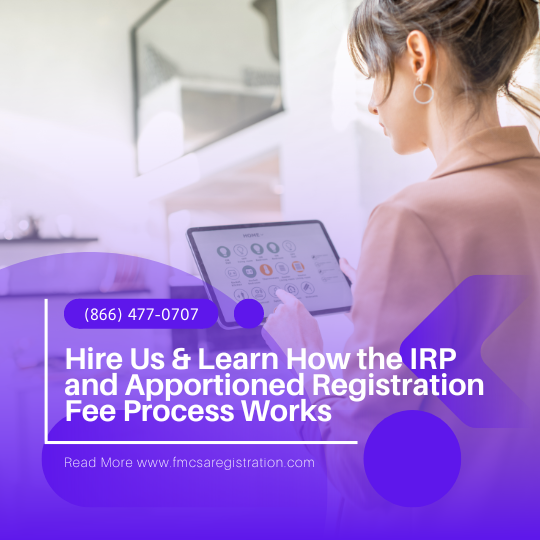
More About IRP Registration Fees
IRP registration lasts for twelve months.
It begins on the very first day of an assigned month. IRP fleets and motor vehicles must get renewed on an annual basis.
The deadline is midnight on the very last day of the registered month.
Of course, refer to your exact assigned registration period. Otherwise, your company could face severe penalties.
The amount of a state registration fee can vary.
Each fee gets based on factors like gross vehicle weight and what your base state is. The average state fee for a commercial truck is around $1,500 to $2,000. Check MC number.
Once you pay your fee, the IRP office will process your application.
They will then mail you a billing invoice. It will describe the mileage apportioned fees due for every state and list the grand total. Say that your billing invoice displays a balance due. You've got to pay that balance within twenty days of your billing date. Check Texas DOT Number
We’re Ready To Help You With IRP and Apportioned Registration
IRP applications can seem very complicated and confusing. what is international registration plan irp. Plus, it can take many hours to complete the applications. So, why not leave registration to the professionals? Our firm is ready to guide you through IRP/apportioned registration at any moment.
We set up hundreds of IRP accounts each month.
Our experts can take care of all your IRP-related needs. They know how to avoid rejection by not making any application errors. All you've got to do is give us a call and tell us your registration needs. We’ll then take care of the rest.
Are Any Vehicles Exempt From the IRP Apportioned Registration Requirements?
In certain cases, there are vehicles with IRP apportioned registration exemptions. But most carriers in commercial trucking must take part in apportioned registration. Say that your vehicle weighs less than 26,000 pounds. Plus, you're only operating as an interstate driver. This means that you could receive an IRP exemption. Plus, your carrier could also secure a temporary commercial trip permit exemption.
Remember to always contact the state or jurisdiction that you're traveling toward.
This way, you will know for certain if you have to file for IRP. We recommend that you do so no matter how much your vehicle weighs. Also, you can have our organization contact state authorities on your behalf. Please give us a call about getting an IRP apportioned plate exemption.
Our team’s prepared to send you more IRP information.
This way, your carrier can adhere to all those DOT and FMCSA policies.
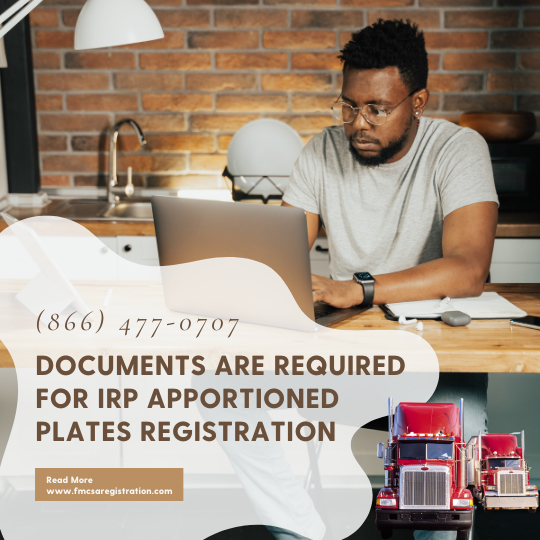
What Documents Are Required for IRP Registration?
Let’s review the documents you must file for IRP registration. The exact documents will vary based on your state and carrier status. So, let’s use IRP registration in California as an example for those who need help. Here are the standard IRP documents that a carrier must file. First, you have to file the California IRP Carrier Data Schedule A/B (MC 2117 I). This filing must include a California Vehicle Data Schedule C (MC 2118 I) filing. You will also need to provide the state with a USDOT number. The number is for the person who plans on operating the vehicle.
Regarding IRP registration, a carrier must have updated its MCS-150.
That update needs to have taken place within the last year. An MCS-150 refers to the Federal Motor Carrier Identification Report. In most cases, a state will also need your Taxpayer ID Number. Or, an SSN (social security number). Most jurisdictions will also accept a Federal Employer Identification Number (FEIN). Once again, let’s use the state of California as an example of apportioned plate registration. The state will ask for documentation that proves the address of your business. Then, you must provide a California driver license number.
Many states will also ask a carrier to file an MC 522I.
This filing refers to the IRP “Agreement to Prepare and Maintain Records” document. Some states will also ask for proof of Federal Heavy Vehicle Use Tax payment. Next, you must provide the state with a verification of your VIN. This stands for the “vehicle identification number.” All the information above will get sent to the Department of Motor Vehicles. Let our organ if you need us to send the DMV your IRP documents.

What Do I Need To Do To Set Up IRP Registration?
You've got to set up an IRP account within the home state of your trucking business. The IRP setup process can take a while. You must fill out applications and provide proof of residency, according to your irp jurisdiction. Then, it’s time to submit documentation. how to apply for irp plateshow to apply for irp plates. Most states ask for a copy of 2290. Some states might demand that you submit an emissions certificate. Once you submit these documents, you can pay the registration fee. How to get California DOT number?
IRP registration criteria varies from state to state.
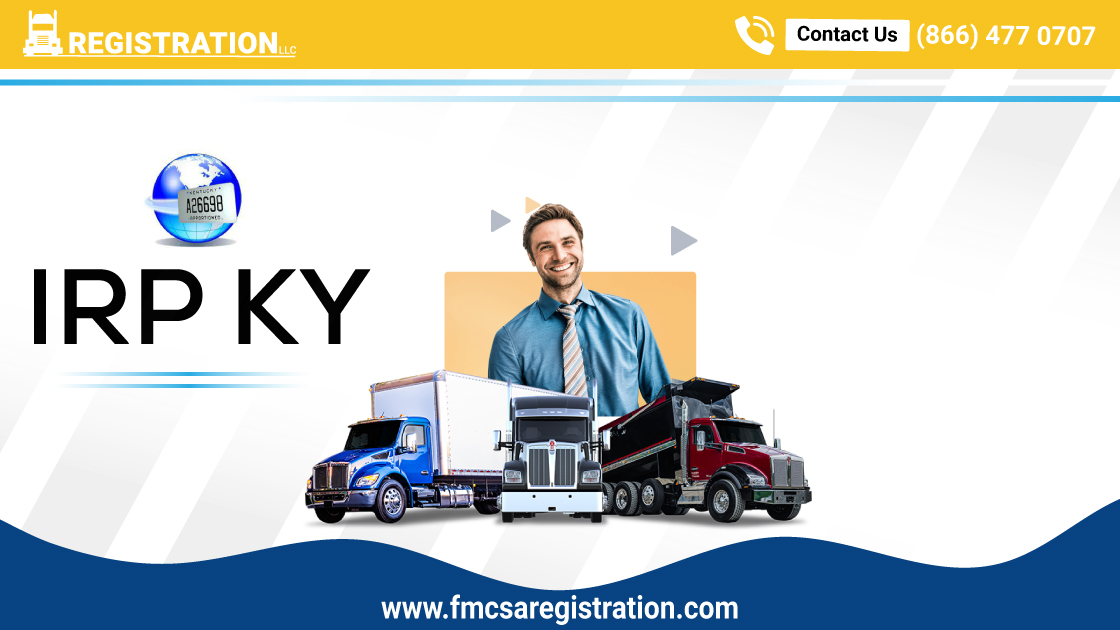
That’s why you should contact your state to confirm the forms that you have to fill out. Ask which documents you must submit that can fulfill all government rules. what is a irp in trucking? There are state government websites where you can download IRP forms. This way, you can bring everything to the state office at once. The efficient power unit propelled the truck, showcasing its reliability and fuel efficiency on the highway.
Who Do I Contact To Get My Plates?
Starting a Trucking Company Package . Each state has its own department that takes care of IRP registration. If you need contact information, please call our organization at any time. Our experts can go state by state and help take care of your IRP registration needs.
Keep in mind that standard IRP registration lasts twelve months.
Registration goes into effect on the first day of your carrier’s assigned month. IRP fleets and vehicles must get renewed on an annual basis. The deadline is midnight of the month's final day within a registration period. Otherwise, your trucking business could experience fines and penalties. Please let our company know if you need more information about IRP documents. We’re standing by to send you a PDF guide about IRP registration.
What Is a Base Jurisdiction about Apportioned Plates?
Here is the definition of a “base jurisdiction.” It is the specific jurisdiction where an applicant has their own business. Per the FMCSA, every base jurisdiction has to function as a physical location. Mileage will get accrued by a fleet or those within each base jurisdiction. A base jurisdiction is also where operational records of a fleet are maintained.
How Long Is the DOT SAP Program?
The US Department of Transportation enforces the SAP to maintain the following schedule. The SAP has to schedule at least six tests within twelve months. But keep in mind that the process can last up to five years. This process functions much like an RTD test. Every SAP follow-up test must be taken through direct observation. This is an official DOT policy. Do you need to find out more information about the DOT SAP Program? If so, please get in touch with our organization. We’re standing by to send those who need information a PDF guide about the program.
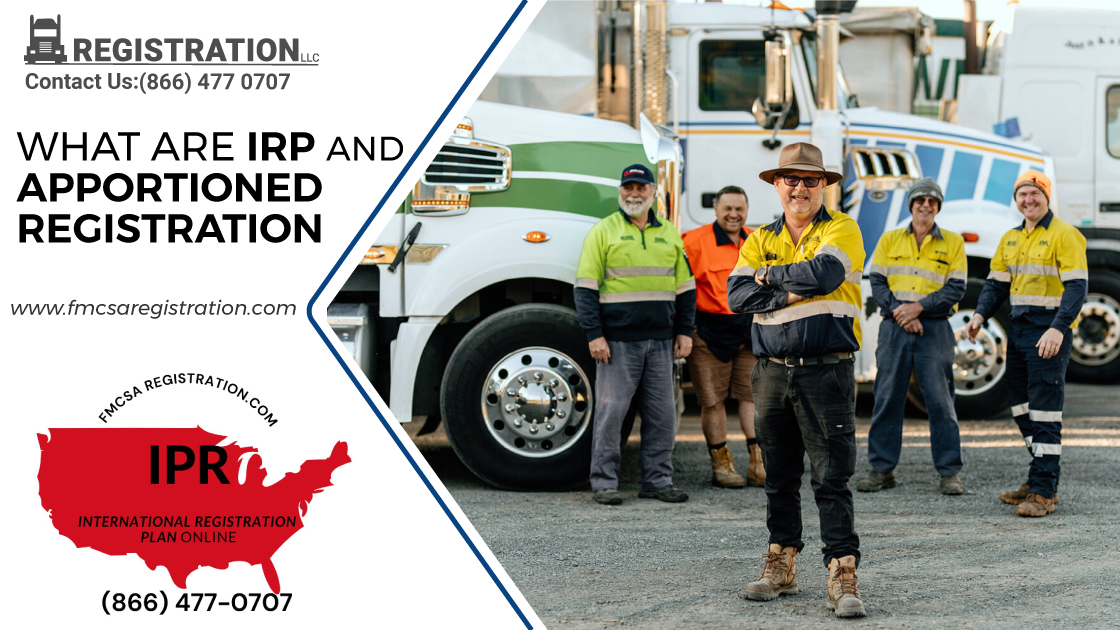
Is the IRP and IFTA the same thing?
While both the IRP and the International Fuel Tax Agreement (IFTA) aim to simplify the regulatory requirements and understanding the distinction can help truckers and fleet owners manage their obligations more effectively. We can narrow down the difference to these functions:
Purpose: IRP focuses on registration and the apportionment of registration fees, whereas IFTA deals with the reporting and payment of fuel taxes.
Payment Focus: IRP payments support road maintenance, while IFTA payments are specifically for fuel tax responsibilities.
What is the purpose of the IRP?
The International Registration Plan plays a vital role in supporting the transportation industry and the broader economy. It was designed to:
Facilitate Commerce: By removing barriers to interstate and international trade.
Protect Equity: Fees are based on where and how much you drive, ensuring each jurisdiction gets its fair share.
Streamline Processes: It makes the filing and registration process simple for truckers operating in multiple jurisdictions.
Do local trucks need to be part of the IFTA?
IFTA is only required for trucks traveling across state lines. However, some local trucks might need to register for IFTA if they:
Occasionally Travel Interstate: Even occasional interstate travel requires compliance.
Carry Goods Across State Lines: Transporting goods across state lines draws in the requirement for IFTA.
Local truckers should evaluate their operations to ensure they meet all necessary regulatory requirements, using services like those offered by FMCSA Registration at fmcsaregistration.com for expert assistance.
By understanding these key aspects of IRP and apportioned registration, professionals in the transportation industry can navigate the composite of interstate and international commerce with greater ease and confidence. Whether managing the nuances of registration or staying compliant with fuel tax agreements, being informed is the first step toward efficient and effective operations.